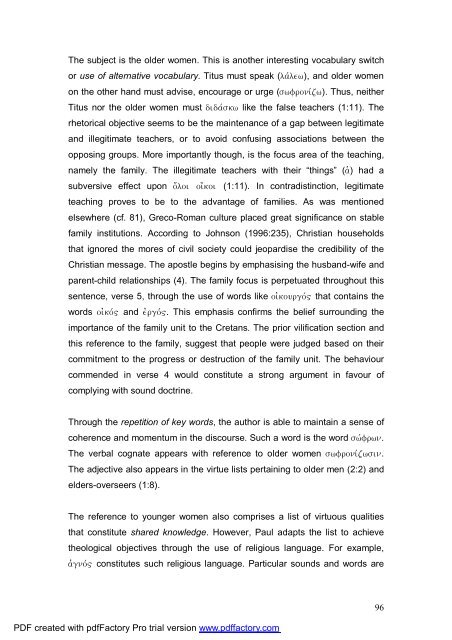A Text centred rhetorical analysis of Paul's Letter to Titus
A Text centred rhetorical analysis of Paul's Letter to Titus
A Text centred rhetorical analysis of Paul's Letter to Titus
Create successful ePaper yourself
Turn your PDF publications into a flip-book with our unique Google optimized e-Paper software.
The subject is the older women. This is another interesting vocabulary switch<br />
or use <strong>of</strong> alternative vocabulary. <strong>Titus</strong> must speak (lavlew), and older women<br />
on the other hand must advise, encourage or urge (swfronivzw). Thus, neither<br />
<strong>Titus</strong> nor the older women must didavskw like the false teachers (1:11). The<br />
<strong>rhe<strong>to</strong>rical</strong> objective seems <strong>to</strong> be the maintenance <strong>of</strong> a gap between legitimate<br />
and illegitimate teachers, or <strong>to</strong> avoid confusing associations between the<br />
opposing groups. More importantly though, is the focus area <strong>of</strong> the teaching,<br />
namely the family. The illegitimate teachers with their “things” (aJ) had a<br />
subversive effect upon o{loi oi[koi (1:11). In contradistinction, legitimate<br />
teaching proves <strong>to</strong> be <strong>to</strong> the advantage <strong>of</strong> families. As was mentioned<br />
elsewhere (cf. 81), Greco-Roman culture placed great significance on stable<br />
family institutions. According <strong>to</strong> Johnson (1996:235), Christian households<br />
that ignored the mores <strong>of</strong> civil society could jeopardise the credibility <strong>of</strong> the<br />
Christian message. The apostle begins by emphasising the husband-wife and<br />
parent-child relationships (4). The family focus is perpetuated throughout this<br />
sentence, verse 5, through the use <strong>of</strong> words like oijkourgov" that contains the<br />
words oijkov~ and ejrgov~. This emphasis confirms the belief surrounding the<br />
importance <strong>of</strong> the family unit <strong>to</strong> the Cretans. The prior vilification section and<br />
this reference <strong>to</strong> the family, suggest that people were judged based on their<br />
commitment <strong>to</strong> the progress or destruction <strong>of</strong> the family unit. The behaviour<br />
commended in verse 4 would constitute a strong argument in favour <strong>of</strong><br />
complying with sound doctrine.<br />
Through the repetition <strong>of</strong> key words, the author is able <strong>to</strong> maintain a sense <strong>of</strong><br />
coherence and momentum in the discourse. Such a word is the word swvfrwn.<br />
The verbal cognate appears with reference <strong>to</strong> older women swfronivzwsin.<br />
The adjective also appears in the virtue lists pertaining <strong>to</strong> older men (2:2) and<br />
elders-overseers (1:8).<br />
The reference <strong>to</strong> younger women also comprises a list <strong>of</strong> virtuous qualities<br />
that constitute shared knowledge. However, Paul adapts the list <strong>to</strong> achieve<br />
theological objectives through the use <strong>of</strong> religious language. For example,<br />
aJgnov" constitutes such religious language. Particular sounds and words are<br />
PDF created with pdfFac<strong>to</strong>ry Pro trial version www.pdffac<strong>to</strong>ry.com<br />
96

















